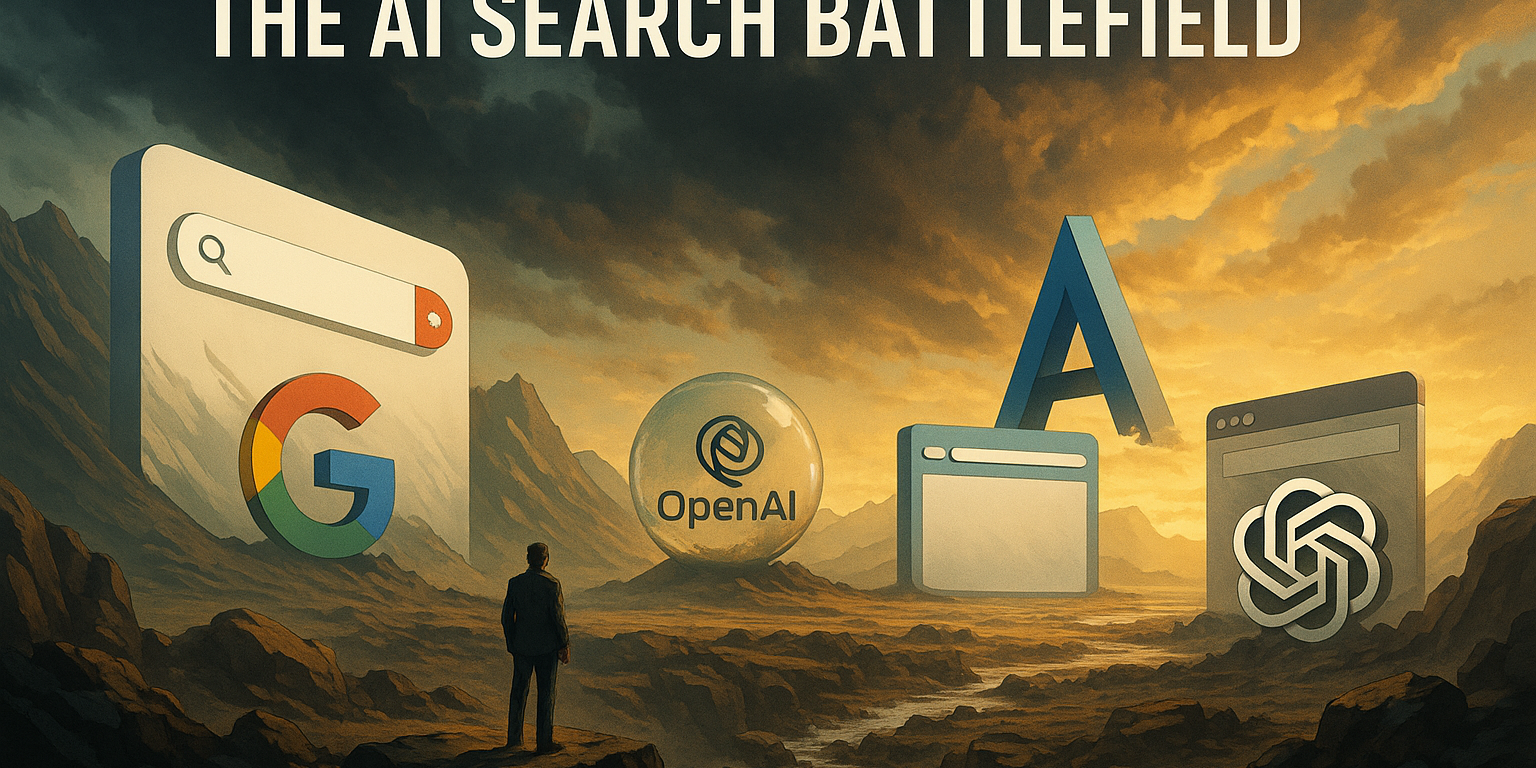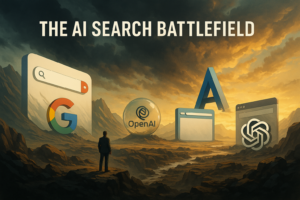A strategic breakdown of the new cognitive interfaces reshaping how we search, decide, and think.
I. Introduction
We are witnessing the slow death of classic web search.
Google, the long-reigning god of information retrieval, is no longer alone. New cognitive agents have entered the ring, challenging the very structure of our interaction with data.
But this is not just a technological upgrade. This is a paradigm shift in the way humans access, process, and operationalize knowledge.
Among the contenders:
- Comet, the agentic browser built by Perplexity.
- Atlas, the newly released AI-native browser experience by OpenAI.
- ChatGPT and Claude, the large language models (LLMs) fueling the generative revolution.
- Perplexity Pro, the hybrid search engine.
- And, of course, Google and your standard browsers (Chrome, Firefox, Edge).
Each plays by a different set of rules. Each encodes a different model of human-machine collaboration.
Let’s map the battlefield.
II. Why This Comparison Matters
It’s tempting to reduce everything to a performance test: “Who answers better?” But that misses the point.
This is not about faster answers. It’s about how these tools structure your thought.
Some guide you. Some simulate you. Some simply echo you. The real question: who helps you think better?
To answer that, we need to compare:
- Not only features, but paradigms
- Not just outputs, but assumptions
- Not interface design, but cognitive consequences
III. The Six Tool Archetypes (and What They Represent)
| Tool | Primary Paradigm |
|---|---|
| Google Search | Index-based information retrieval |
| Browser (Chrome, Firefox) | Manual exploration of the web |
| LLM (ChatGPT, Claude) | Conversational synthesis |
| Perplexity | AI-powered source-grounded summary |
| Comet | Strategic agentic reasoning |
| Atlas (OpenAI) | Contextualized browser assistant |
Each embodies a different interface-to-cognition relationship.
Let’s examine them side by side.
IV. The Strategic Grid: How Each Tool Actually Works
| Criteria | Classic Browser | ChatGPT (Browser) | Perplexity | Comet | Atlas | |
| Info unit | Page | Page | Answer | Answer+source | Structured synthesis | Contextual reply |
| Navigation model | Query > link | Manual tabs | Text window | Chat interface | Multi-tab agent | Tab-aware agent |
| Memory | None | None | Session-based | Minimal | Low | Persistent |
| Multi-tasking | None | Manual | Linear interaction | Single-threaded | Cross-tab | Embedded |
| Agentic capacity | None | None | Low | Low-medium | High | Medium-high |
| Output format | List of links | Visual page | Paragraphs | Bullets + sources | Structured + actionable | Assistant summary |
| User posture | Clicker | Explorer | Conversationalist | Summarizer | Strategist | Assisted operator |
| Goal | Find info | Reach page | Get help | Understand | Decide | Operate |
V. Why Comet Is Not Just “AI Search”
Most people see Comet as “Perplexity with a browser skin.” They are wrong.
Comet is not about accessing information. It’s about modifying your relation to it.
Here’s what Comet does differently:
- Extracts data across tabs
- Fills structured formats (e.g. tables)
- Forces criteria clarification
- Encourages scenario comparison
- Executes actions (e.g. summarizing Gmail threads)
This moves the user from spectator to operator.
What’s more: Comet thrives on tension. The more contradictory your request, the more valuable the output.
Comet is a thinking partner, not a knowledge mirror.
It’s also the ideal execution ground for AQM – the Asymmetric Questioning Model, designed to create intellectual friction and force lucid decisions.
VI. What Atlas Promises
Atlas, from OpenAI, is positioned as:
“A browser experience that’s fast, accurate, and personalized to you.”
It embeds the AI into your browsing flow:
- Understands the page you’re on
- Can plan, summarize, shop, extract, book, organize
- Memory-aware: your past queries shape future answers
In short: Atlas follows your intent. Where Comet invites you to structure it.
Atlas is the assistant. Comet is the agent.
This matters. Assistant: suggestive, helpful, invisible. Agent: assertive, structured, directional.
Atlas will be loved by those who want fluidity. Comet will be used by those who want clarity.
VII. Use Cases by User Type
| User | Best Tool | Why |
| Casual browser | Google, Atlas | Fast, familiar, non-intrusive |
| Research student | Perplexity, Atlas | Source-based summary, memory continuity |
| Strategist | Comet | Agentic, structured, scenario modeling |
| Marketer | Perplexity, Comet | Competitor insight, synthesis, analysis |
| Executive / CXO | Comet | Strategic modeling + what-if simulation |
| Task manager | Atlas | Booking, planning, execution agent |
VIII. Paradigm Shift: From Searching to Thinking
Google brought us speed. Comet brings us structure. Atlas brings us integration.
Each represents a response to the same pain: information overload. But only Comet reframes the act itself.
Google answers. Comet forces questions. Atlas adapts. Comet confronts.
You don’t just get better outputs. You get a better mental model.
X. Recommendation Table: Strategic Choice Guide
| Goal | Recommended Tool |
| Find a quick fact | |
| Summarize an article with sources | Perplexity |
| Compare 3 competitors’ pricing pages | Comet |
| Plan a weekend with AI assistance | Atlas |
| Simulate a strategic what-if | Comet |
| Review documents for insights | Atlas |
| Benchmark two business models | Comet |
| Write a blog post with context | ChatGPT (browser) |
X. What’s Really Changing
We are entering an era where:
- Search is no longer about answers.
- Browsers are no longer passive containers.
- AI is no longer a chatbot.
The browser becomes a thinking interface. The user becomes a strategic orchestrator.
Comet and Atlas are not versions of each other. They are different mental prosthetics.
Choose wisely.
Author: Cyril Bladier
Strategic Advisor, AI Trainer, Creator of the Asymmetric Questioning Model (AQM)
“Don’t just automate tasks. Elevate your cognition.”




